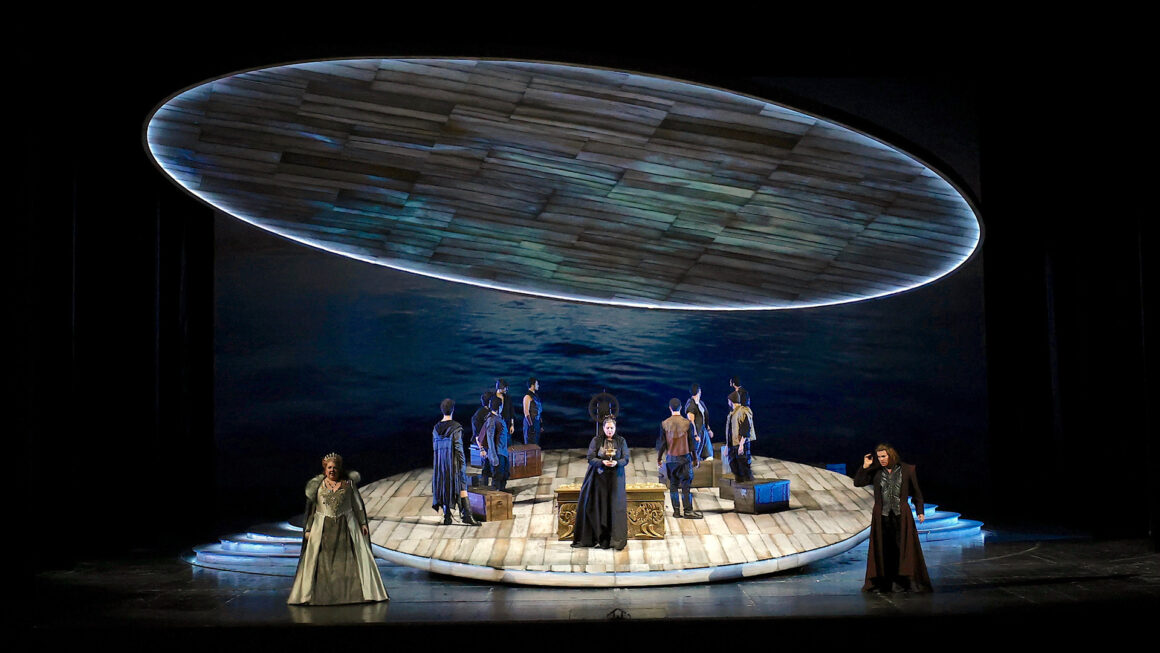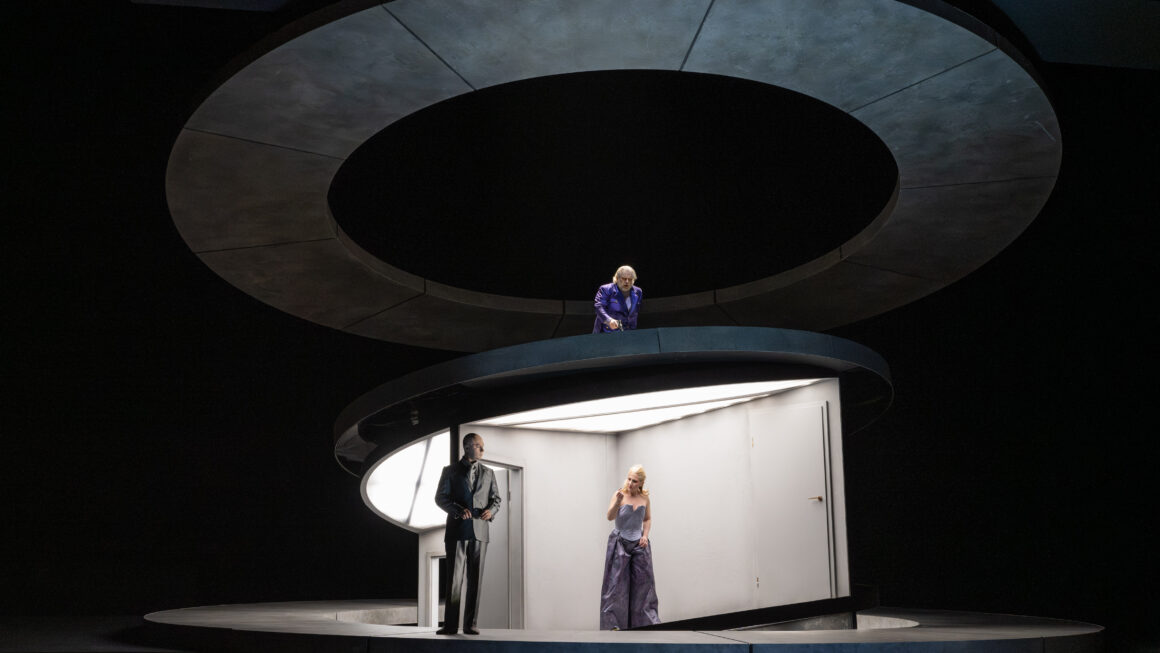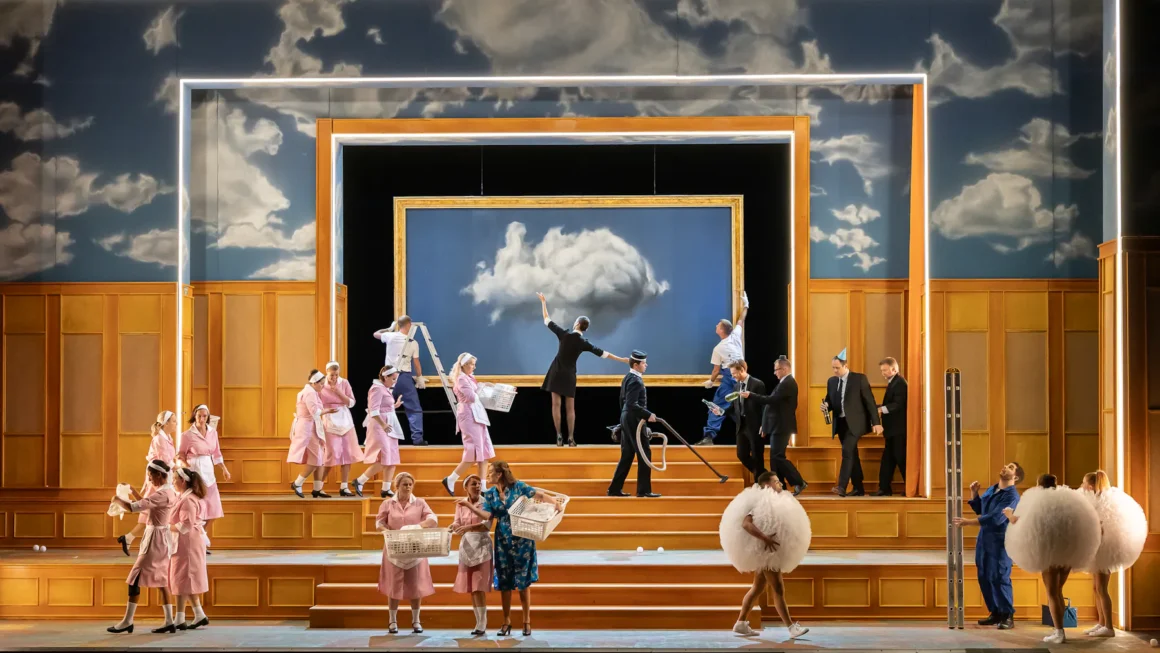The première of The Queen of Spades (Pique Dame in German) took place in the warmly inviting setting of the Oper Leipzig auditorium, elegantly adorned with understated wooden panelling and delicate gilded accents – a subtle yet dignified reminder that we are within the hallowed temple of lyrical art in the most populous city of East Germany (after Berlin). It was here, in the 18th century, that Telemann once held the esteemed position of director. The audience’s joy and enthusiasm were unmistakable, as they arrived in great numbers understandably so, given the impressive cast, the promising stage direction, and the presence of a conductor well-versed in the Russian repertoire. We were comfortably seated, enjoying the rare luxury of generous legroom, and the mild spring weather of this beautiful Saturday only served to heighten the buoyant spirits of the evening.
As the curtain rises, there is no Summer Garden, but rather a barren battlefield: arid, lifeless soil, from which only withered branches emerge, bearing witness to the presence of a grave. The Countess (Ulrike Schneider) comes to mourn at this solemn site, which is evidently the grave of Hermann (Brenden Gunnell). A departure from the original work? Certainly not. Lorenzo Fioroni chooses not to recount the misfortunes of the young officer – who retains his original status – but rather to narrate the story as Hermann himself experiences (or endures?) it, shifting the perspective entirely. This change in lens requires us to consider that Hermann is a soldier who has lived through the harrowing realities of war, a fact that has undoubtedly shaped his relationship with the tangible world. Under Anna Skryleva’s direction, the tempo is gentle, enveloping, and imbued with boundless romanticism. While the staging may initially disorient, there can be no doubt when it comes to the music: Tchaikovsky’s fervent spirit reigns supreme from beginning to end.
Let us return to the story: upon this same battlefield appears the children’s choir. Marching in strict military formation, clad in uniforms and bearing flags, they represent the newest recruits, regardless of whether they are young girls or boys: for the war effort demands the contribution of all, at every stage of life. It is at this moment that we may begin to question the appropriateness of situating the narrative within a context so resonant with present-day events. To intertwine a bellicose setting with a Russian opera, composed by a Russian musician, and infused with a succession of motifs traditionally linked to Russian culture – all while a conflict, its resolution perpetually advancing and receding, unfolds less than 2,000 kilometres away – one might wonder: is this truly a judicious choice? The production, in itself and with only a few minor imperfections, proves compelling, yet does this tale fully belong in such a milieu? We shall refrain from answering the question, for this is not the purpose of this review, but given the aesthetic considerations that arose during and after the performance, we permit ourselves to pose it here.
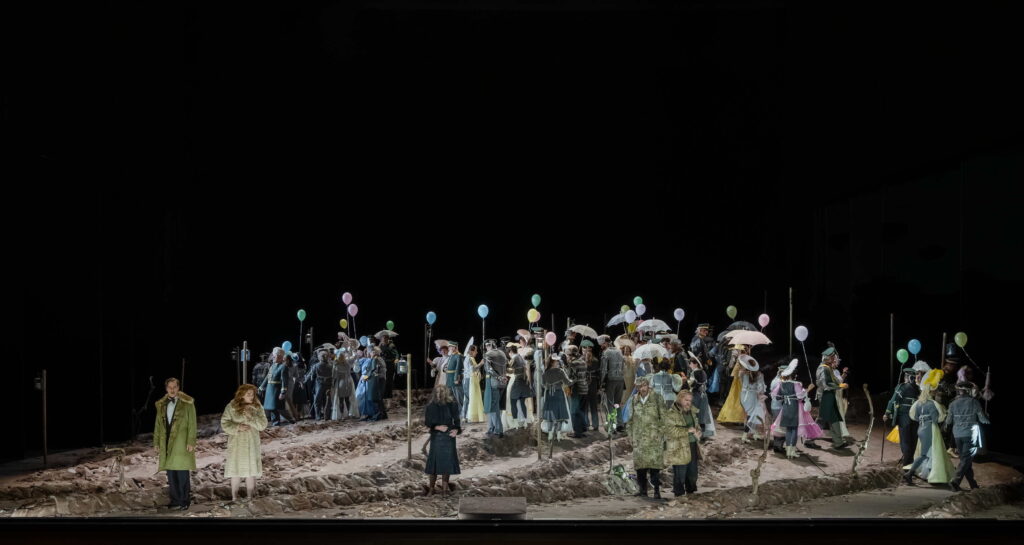
Hermann, then, a man who has endured the agonies of war, comes vividly to life through Brenden Gunnell’s fiery portrayal, his unwavering commitment palpable from the opening moments to the final curtain. The intensity with which he inhabits the young officer is striking, rendering each of his traits entirely believable. From the outset, there are subtle indications of his descent into madness – prompting us to consider how his wartime experiences might have irreversibly shaped his tenuous grip on reality – signs that only grow more pronounced until his delirium reaches its most violent extremes, both suicidal and laced with a cruel irony. Alongside him, Dan Karlström’s Chekalinsky and Evert Sooster’s Surin radiate disdain and mockery, their performances wholly convincing, their vocal delivery assured. As for the Countess’s recollections of her encounters with the Count of Saint-Germain, Tuomas Pursio (Count Tomsky) delivers an exemplary narrative, his voice perfectly attuned to both the role and the dimensions of the auditorium – meriting the rapturous applause that follows his aria. And so arrives the tempest, though perhaps it is not mere thunder, but rather the distant reverberations of bombs falling near…?
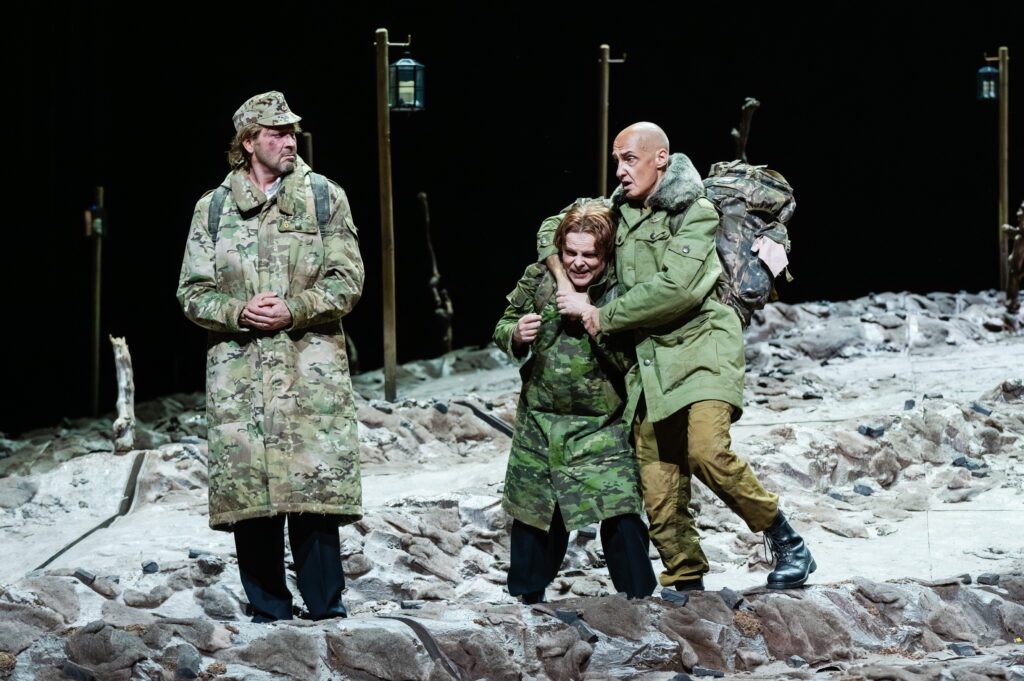
A change of scene: we now find ourselves in Lise’s chamber (Solen Mainguené), where Polina (Nora Steuerwald) sits at the piano, surrounded by as many friends as bottles of champagne (let us immediately highlight the exquisite finesse with which the secondary female roles are performed: a true delight, both scenically and musically). Despite the slightly inebriated atmosphere, a profound delicacy emanates from their duet – a true salon romance that persists despite the devastation unfolding beyond these walls. This element of the set design amplifies the melancholy that permeates the text. In Mainguené’s portrayal of Lise, an unexpected aggression surfaces – perhaps the frustration of an unfulfilled desire, the remnants of late adolescence, or a reckless disregard for the tragedy surrounding her? Whatever its source, she delivers it convincingly, yet tempers it through subtle vocal nuances, rendering her interpretation compellingly layered. Every effort she makes to humanize Lise is evident, though it is striking to observe how she appears, in many respects, to be Hermann’s female counterpart. The drawback of this approach? The dramatic weight of certain pivotal moments – particularly following the Countess’s murder (strangled at Hermann’s hands) – is somewhat diminished. Yet, despite this, the pairing remains utterly forceful, their stage chemistry undeniable.
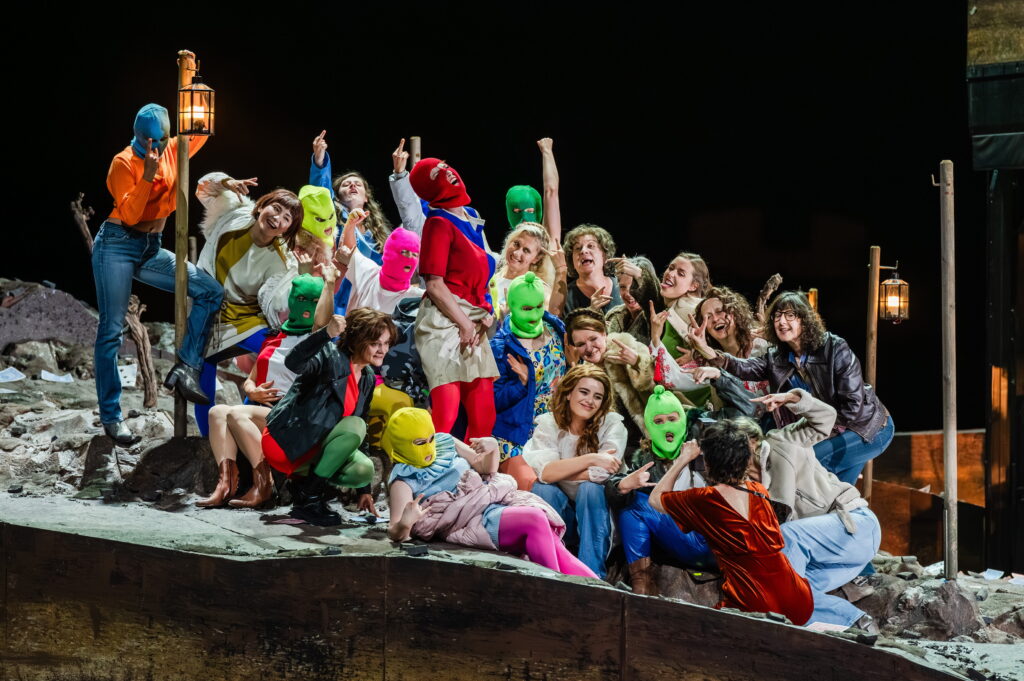
The sense of restraint, refinement, and elegance is upheld by the performances of Mathias Hausmann as Prince Yeletsky and, above all, Ulrike Schneider as the Countess. The former possesses an innate aristocratic bearing, complemented by a supple timbre and a voice that resounds effortlessly throughout the auditorium. Regarding the Kammersingerin – the undisputed primadonna of the evening despite her relatively few appearances – it is the lingering echoes of a distant glory, intertwined with the tantalising power of an unfathomable secret, that shimmer through her silvery mezzo-soprano tone – like the gown she wears during her Je crains de lui parler la nuit, shimmering with the same elusive grandeur.
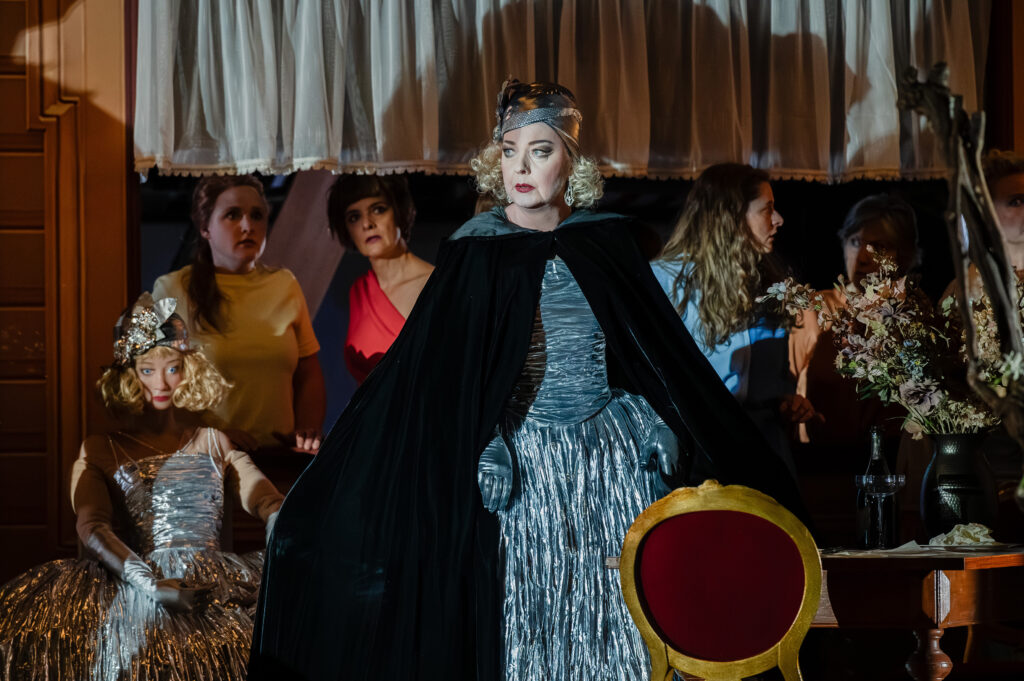
From this point onwards, the staging’s intentions grow increasingly opaque, and certain excesses – such as Hermann and Lisa’s drug scene – prove somewhat disconcerting. The dramatic progression is not entirely uniform, yet the pleasant surprise elicited by the final scene (particularly when we consider that, from this moment onwards, all of Hermann’s madness appears to subside owing to the certainty of success in gambling) is irrefutable. Nevertheless, given the circumstances, the unwavering commitment of the singers deserves all the more praise, as they plunge into the depths of madness, carrying the narrative inexorably towards Hermann’s tragic end. Whether in the chorus or among the secondary characters, each performer invests equal effort, ensuring that the production delivers a spectacle of extraordinary theatrical and, above all, musical splendour, with an orchestral accompaniment of unequalled finesse and direction extremely reverent to the score. For this reason, and for the profound emotion that this evening has evoked, it seems evident that this production is truly worthy of the highest interest. Surely, we shall hear more of it: may it be in the most favorable light!
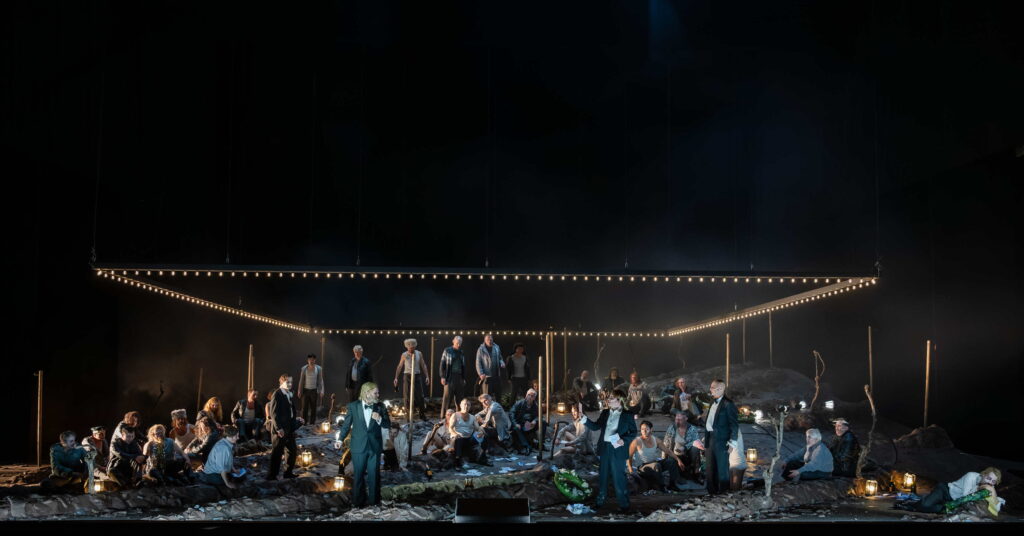
::::::::::::::::::::::::::::::::::::::::::::::::::::::::::::::::::::::::::::::::::::::::::::::::::::::::::::::::::::::::::::::::::::::::::::::::::::::::::::::::::::::::::::::::::::::::::::::::::::::::::::::::::
THE QUEEN OF SPADES | PIQUE DAME
Opera in three acts and seven pictures by Peter I. Tchaikovsky
Libretto by Modest Tchaikovsky (after Alexander Pushkin)
Cast: Hermann (Brenden Gunnell) · Count Tomsky/Zlatogor (Tuomas Pursio) · Prince Yeletsky (Mathias Hausmann) · Chekalinsky (Dan Karlström) · Surin (Evert Sooster) · Chaplitsky (Daniel Arnaldos) · Narumov (Peter Dolinšek) · Master of Ceremonies (Ruben Olivares) · Countess (Kammersingerin Ulrike Schneider) · Lisa (Solen Mainguené) · Polina/Milovzor (Nora Steuerwald) · Governess (Kathrin Göring) · Mascha/Prilepa (Merit Nath-Göbl) · Chor der Oper Leipzig · Kinderchor der Oper Leipzig · Komparserie der Oper Leipzig · Gewandhausorchester.
(For further informations) Link to the Oper Leipzig website: The Queen of Spades (2025 production) – Oper Leipzig


